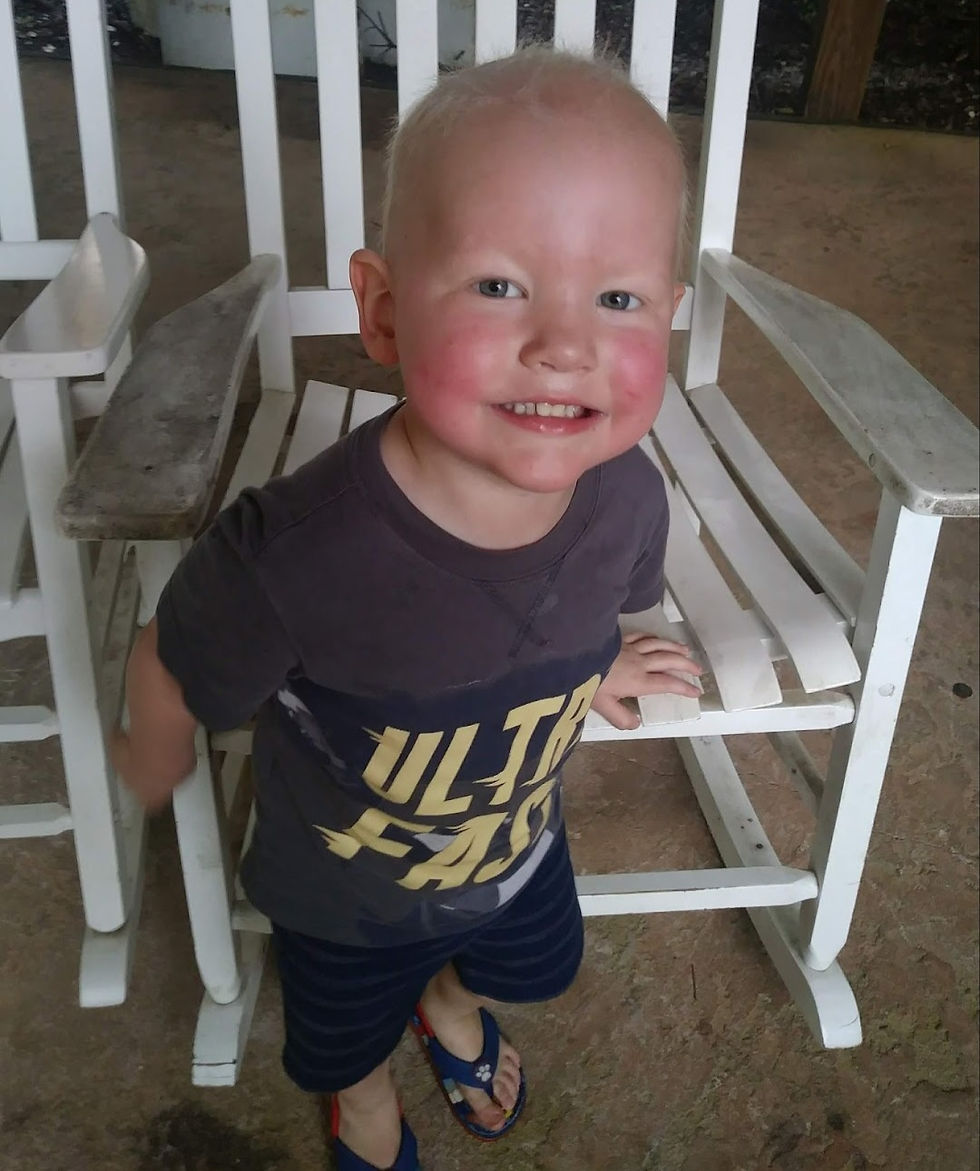The Forbes Family Story
- Lighthouse Family Retreat

- May 23, 2022
- 6 min read
When Jonah was two years old—just before his third birthday—his parents, Liza and Josh Forbes, noticed that he was bruising really easily. “In my mind, I didn’t immediately think, Oh, my kid has cancer,” Liza remembers. “I think because we’re told how rare things like that are, so whenever you Google search and it says ‘leukemia,’ you think, I’m not even gonna click on that because I know that’s not what’s going on.”
But a few days later, after heading back from a vacation to the mountains in Tennessee, Jonah began complaining that his legs hurt. Once again, the symptom was easily explained though: they had just spent 10 hours in the car.
When Jonah spiked a fever a few days later and it wouldn’t break, they decided to take him to the pediatrician, still assuming it was a virus. The doctor did a CBC (a full blood count) at Liza’s request, who assumed that Jonah probably needed iron, as his older brothers had had similar issues before.
It was a shock when the pediatrician came in and delivered the news that Jonah’s platelets were at 23,000. The doctor still said she didn’t think it was anything serious, but she sent the Forbes family on to the oncology unit at the children’s hospital, and within about two hours, they had a diagnosis: leukemia.
Josh shares that, despite the fears that came with hearing the word ‘cancer,’ their doctor’s assurance brought them some measure of peace. “This is our bread and butter, this is what we do—we fight pediatric cancer,” he recalls the doctor saying.
Thankfully, despite learning that Jonah was considered high-risk due to a genetic mutation, the rest of Jonah’s genetic markers, as well as his age, put him in a more favorable bracket for his prognosis.

“The prognosis is about a 90% survival rate for five years, so I’m thinking, this is not a death sentence,” Liza remembers of her reaction to the news. “So, I did feel a little more ease about that, but still, knowing what he was about to go through with treatment was scary."
And that was before Liza and Josh knew all that Jonah’s treatment would entail. “They didn’t tell us immediately that we were looking at 3.5 years of treatment—they probably knew it would overwhelm us,” Liza says.
Jonah’s high-risk diagnosis also meant in-patient stays in the hospital, as well as some intense chemotherapy in certain phases.
On top of this diagnosis, Josh and Liza were also managing life with two other young children. Just before Jonah got sick, they had received the surprise news that Liza was pregnant again. She had some complications, and the high-risk pregnancy meant Liza was also going to the doctor once a week so she could be monitored.
“And then trying to mix that with Josh trying to work, our kids in school, and Jonah going to the doctor a lot at that stage in treatment,” Liza says. “I was so afraid that the baby was going to come out and be sad because I was just so sad and upset during my pregnancy.”

Not only that, but the stage of treatment Jonah would be in during the time the baby was to be born was going to be the toughest phase: delayed intensification. Sure enough, Jonah did end up in the hospital for a month while they had a newborn at home. It was indeed hard.
But the surprise baby ended up being a huge gift to the family. “He brought so much joy to our life,” Liza explains. “He brought so much joy to everybody—and you don’t know what you need, but God does. It gave us sunshine on really dark days.”
Some of those dark days included dealing with some problems with Josh’s former employer, who reneged on an arrangement they had made during this time. “But God opened up a door for me to get out of there,” Josh shares. “And that helped out a lot, because the new employer was more understanding.”
Being able to balance it all was definitely the biggest struggle for the two parents, as well as the fact that they were dealing with so much of it alone. Like many couples going through childhood cancer, they were surprised to have a lot of friends disappear when things got hard. But they don’t speak with bitterness about that—instead, they speak with gratitude for the new friends they made, as well as their friendship with each other that was strengthened.
“But obviously it’s not easy on a marriage,” Liza adds. “It’s hard, because you have so much that you’re involved with, with treatment and everything, and you’re trying to keep everything functional in your home. And you’re just spent—you don’t have anything left for each other anymore. So, it got hard for a while too.”

The years of treatment were hard on the siblings as well. Liza shares how one child struggled with some anxiety throughout it all, worrying about this brother. And they had some behavioral issues with another child, who wasn’t old enough to understand why his brother was getting so much attention and presents from others. But the parents did their best to include the brothers as much as they could, as well as being intentional about taking time one-on-one with each child. “Josh and I would try to take each of them one at a time whenever we could, even if it was just to grab lunch together or go to a movie together,” Liza remembers. “And Josh would try to take the boys fishing and stuff like that. I think that definitely helped.”
There are a few things that Liza and Josh say got them through the hard season. For starters, “lots of prayers,” Liza says. “I feel like we were religious before he was diagnosed, but after he was diagnosed, you realize that you’re not in control of anything. And I’m kind of a control freak; I like things to be a certain way. I like to have a plan for everything, and a backup plan for everything. So, whenever you lose that control, you just have to rely on God.”
She also shares the importance of having a sense of humor about things— laughing about things that other people probably wouldn’t laugh about. And she expresses how important it was to surround herself with people on a similar journey, remembering one specific instance when a family on the same floor as Jonah came over with their child on treatment to introduce themselves. “She brought her daughter in, and it just wasn’t what I thought a cancer kid would look like. I was thinking she would look sick... But it gave us so much hope to see other families going through treatment and doing well.”
Liza and Josh also recommend that parents of a newly diagnosed child find support wherever they can. Liza has found online groups like Momcology to be very helpful. “Whenever I’m having a meltdown, and I'm like, Is this normal?, I can check in. And you get a lot of good information from parents who are going through treatment or who have been through treatment.”
Because of the help she received from others, Liza reaches out to others who have had children receive a cancer diagnosis. “When you first start the journey, you’re so lost,” she explains. “You feel so alone. You feel like the world outside keeps spinning, and you’re just stuck here in this hospital room. Your world has been turned upside down and you feel alone, and it’s scary.”
Josh echoes Liza’s sentiment, and he encourages newly diagnosed families to reach out and ask for help, even though that’s hard to do.

Thankfully, Jonah completed his treatment—he rang the bell in July 2021. Now the family is trying to settle into the newest version of normal, which includes continuing anxiety about Jonah getting sick again. “It’s a mixed bag,” Liza explains. “From the beginning of treatment, we were looking forward to the day that he would ring the bell, but then the day gets here, and you think, I didn’t really feel that much better. I’m happy he’s done with treatment, but I’m sure he gets so tired of me examining him 24/7 because he has a bruise somewhere. Every little thing sends you into a panic, so I’m wondering when that gets better.”
“Of course, we’re happy,” she continues. “We’re so happy he’s in school, he’s doing well, he’s healthy. His last checkup was great, and his counts are all good. But it’s just the fear of going back to that place you never want to go back to. It is hard to look at photos of him in treatment—one of him I saw the other day was right at the beginning, and it was just really difficult. Because that’s a place you don’t want to go back to—just the thought of it scares you to death. And I don’t know if that will ever go away.”



